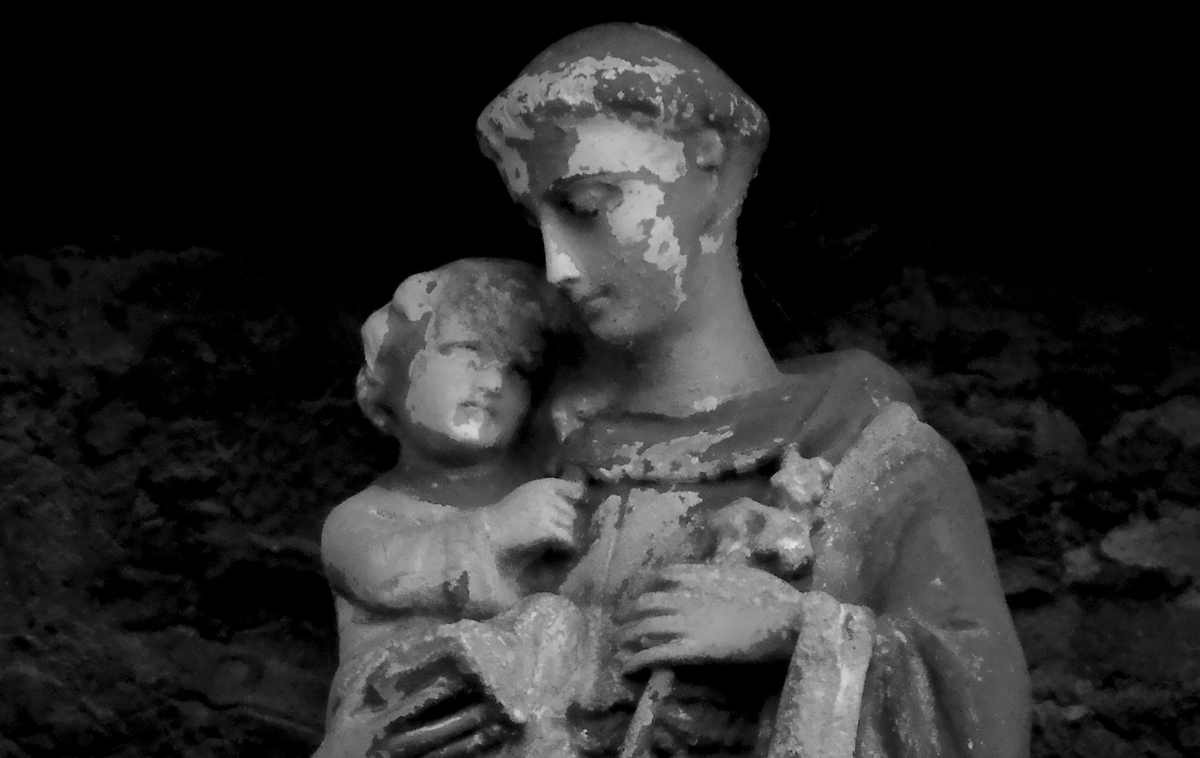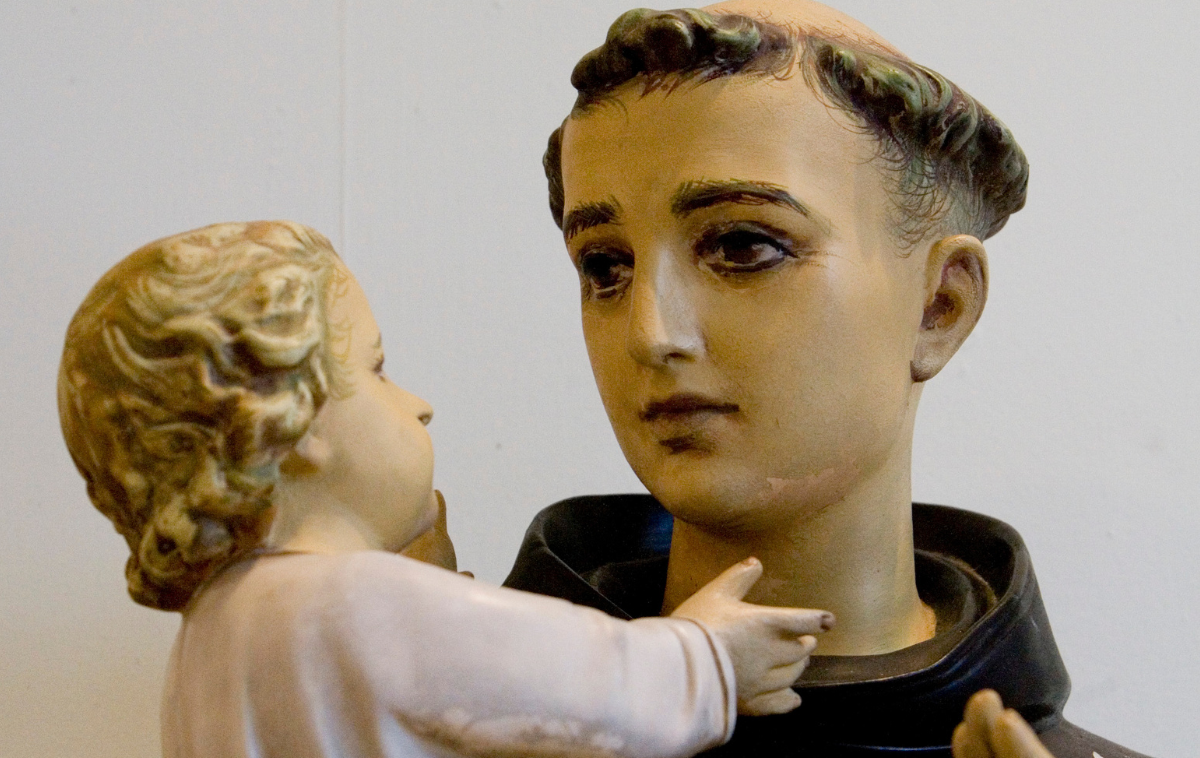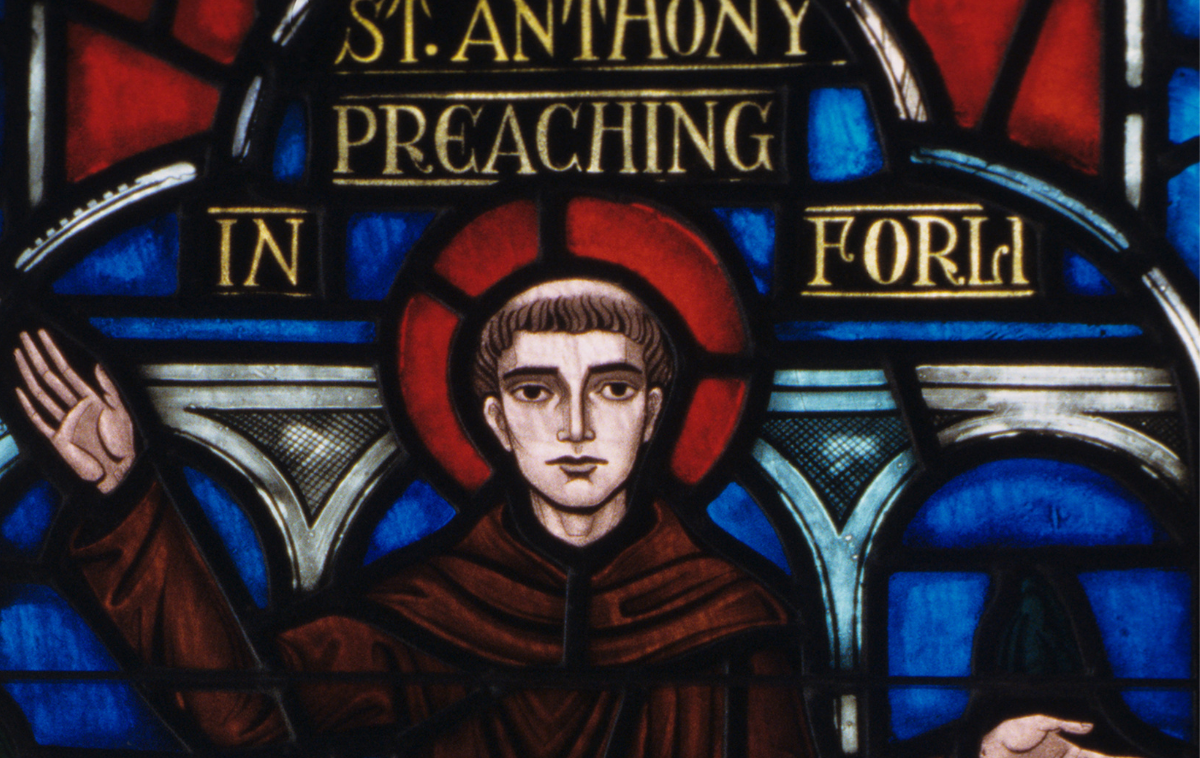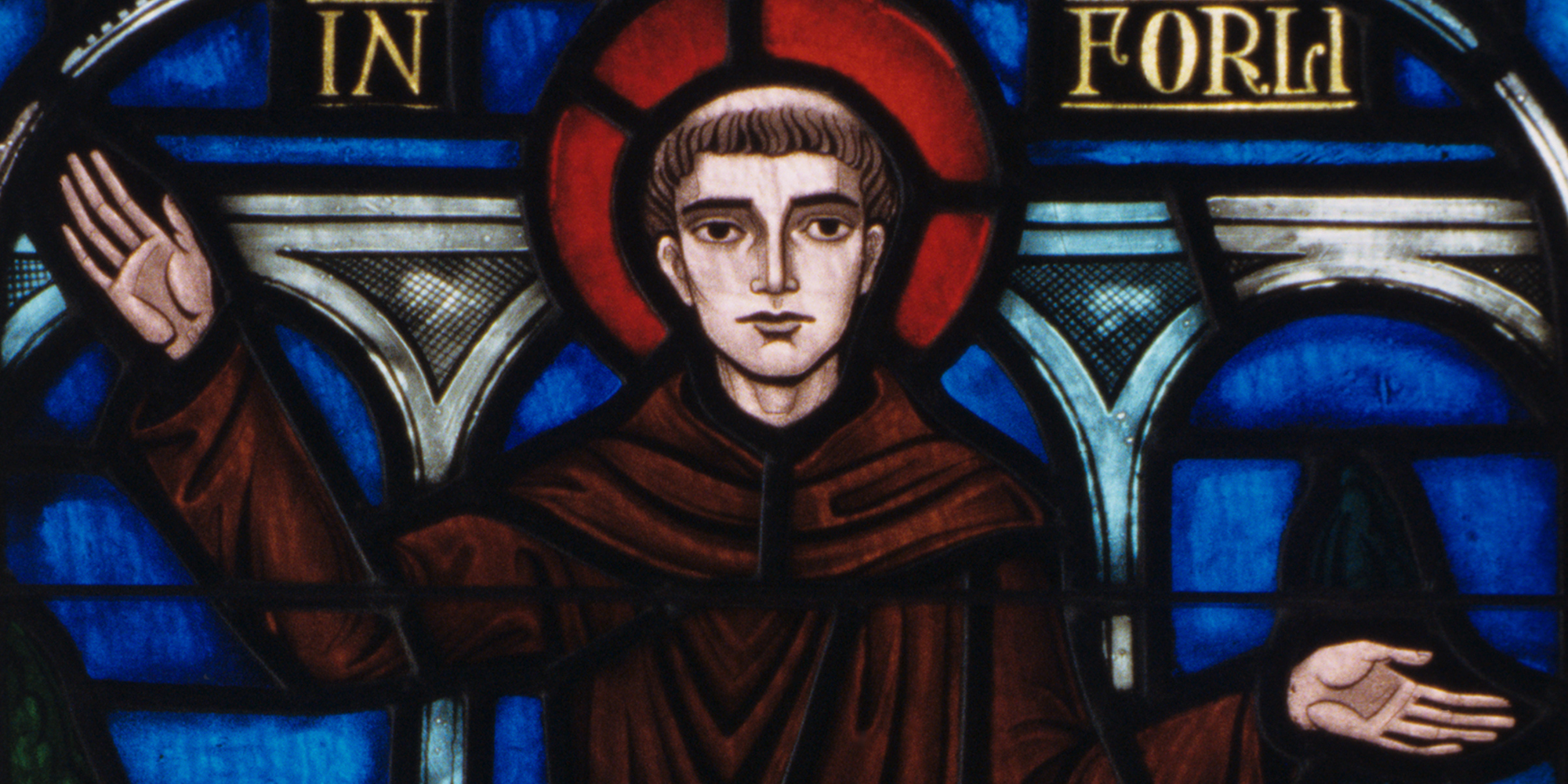Who is St. Anthony?
Author: Eli Pacheco
Date Published: June 11, 2025
The patron saint of lost and stolen possessions, St. Anthony of Padua
(1195-1231) was a Franciscan friar known for his eloquent preaching,
profound knowledge of Scripture and unwavering commitment to help the
poor and the sick. He is frequently depicted holding a book or the
Bible, the Christ Child or a lily.
St. Anthony was born Fernando
Martins de Bulhões on Aug. 15, 1195, to a wealthy noble family in
Lisbon, Portugal. At age 15, he entered the community of Canons Regular
at the Abbey of St. Vincent against his family’s wishes. Seeing his
scholastic potential, the Canons sent him to the Abbey of the Holy Cross
in Coimbra, Portugal’s former capital, for nine years of intense
theological studies in the Augustinian tradition. He was ordained to the
priesthood and appointed the abbey’s guest master.

Often depicted holding the Christ Child, St. Anthony wanted to join the Franciscans so that he could travel to Morocco to preach. (Photo courtesy of Jan Van Bizar)
Anthony’s altered path
In
1219, Fernando encountered five Franciscan friars who were enroute to
Morocco to preach the faith to the Muslim community. Less than a year
later, news arrived that they had become the first martyrs of the
Franciscan Order. As their bodies were processed through Coimbra,
Fernando was so inspired by their witness that he went to a nearby
hermitage and asked to join the Franciscans, saying:
“Brother, I
would gladly put on the habit of your Order if you would promise to
send me as soon as possible to the land of the Saracens, that I may gain
the crown of the holy martyrs.”
He took the name Anthony after
the patron of their hermitage, St. Anthony of Egypt, and hoped to become
a missionary. He went to Morocco but fell seriously ill after a few
months and tried to make his way home. Storms diverted his ship to
Sicily, where the friars of Messina welcomed him and began nursing him
back to health. He was recovered enough to attend the Order’s General
Chapter of 1221 in Assisi, also known as the Pentecost Chapter of Mats
(because there was not enough housing for the 3,000 friars, they were
required to sleep on mats).
After the Chapter, Anthony
approached the Provincial Minister (the leader) of the province in
Northern Italy and asked that he be instructed in the Franciscan life.
He did not mention his prior theological education and so was assigned
to work in the kitchen of the rural hospice of San Paolo near Forlì in
Northern Italy.

St. Anthony was selected to deliver a “simple” sermon that turned out to be a pivotal moment in his ministry with the friars. (Photo courtesy of the Province of Our Lady of Guadalupe)
What was St. Anthony known for?
In
a moment of truth that would shape his destiny, a young man once drawn
to the solitude of prayer climbed to prominence with an extraordinary
homily delivered during an ordination attended by Dominicans and
Franciscans in 1222.
When no one answered the provincial's
request for a sermon, Anthony was chosen. Unknown to them, he was
well-versed in Augustine and Franciscan philosophy. His holiness and
wisdom were clear to all there and so began a lifetime of preaching.
St.
Francis appreciated how Anthony's actions aligned with his words,
unlike many preachers of the time whose pride in their knowledge led to
them abandoning a life of poverty. St. Anthony embodies the importance
of persistence in seeking truth and justice.
On the Commission for the Franciscan Intellectual Tradition’s website, Franciscan historian Br. Dominic Monti, OFM, describes Anthony’s preaching:
“Anthony’s preaching emphasized the connection between conversion
to the Gospel and working for justice in society. For example, he
persuaded the government of Padua to come to the aid of people in
financial difficulty: instead of being imprisoned for debt, a person
could instead declare bankruptcy and pick up their life again. In such
ways, Anthony became beloved by the poor for drawing the attention of
society to their plight.”
St. Anthony’s teaching
He
also taught theological studies to friars pursuing ordination. St.
Francis trusted Anthony to educate the younger friars because he knew
that St. Anthony would not let his knowledge make him prideful.
Throughout his life, Anthony was an example of Franciscan poverty and
humility.
In addition to teaching and preaching, Anthony also
served the Franciscan Order in various roles, including Provincial
Minister of the friars in Northern Italy, where he made his home in
Padua, the city he is now most closely associated with.
St.
Anthony died on June 13, 1231, at age 35 and was buried in the small
church of Santa Maria Mater Domini. He was canonized the next year by
Pope Gregory IX, one of the fastest canonization processes in history,
and his body was eventually moved to the Basilica of St. Anthony in
Padua, completed in 1310.
Did you know?
St. Anthony is also the patron saint of:
Fisherfolk
Priests
Sailors
Travelers
Anthony
was proclaimed a Doctor of the Church by Pope Pius XII in 1946 because
of his missionary efforts and theological understanding.
When is St. Anthony’s feast day?
June
13. A feast day is a fixed date to honor saints or notable events in
the Catholic tradition. Initially commemorating martyrdom, feast days
now include all saints. “Feast” comes from the Latin word for
celebration, “festes.”
What is St. Anthony Bread?
The
term “St. Anthony Bread” applies to donations given to the church for
distribution to people in need, typically after answered prayers to St.
Anthony. According to tradition, the practice started in 1263 when a
child drowned near the Basilica of St. Anthony.
The child's
mother prayed and vowed to donate grain equivalent to her child's weight
to help feed the poor if her child could be restored to life. After the
child's recovery, she upheld this pledge, marking the earliest known
instance of St. Anthony Bread offerings.
Some parishes
distribute blessed loaves of bread on the feast day of St. Anthony. “St.
Anthony’s Bread” can also refer to these loaves.
H5: Did you know?
Baffled
by his inability to reach certain audiences, legend said that Anthony
once preached to the fish in a river. Astonished onlookers are said to
claim the fish appeared to gather at the shore and listen. At the end,
Anthony blessed the fish, and they departed.

St. Anthony is seen as a symbol of hope and support in difficult times. (Photo courtesy of the Province of Our Lady of Guadalupe)
How do I pray to St. Anthony for urgent help?
People often turn to St. Anthony in moments of desperation, seeking his divine prayer not only to find misplaced possessions but also to find solace and guidance with life's challenges. He is esteemed as a beacon of hope and a faithful companion in times of need. Here are some of the most common intercessions:
For finding items
“O Holy Saint Anthony, patron of lost things, I am in urgent need of your intercession. Please pray for me and help me find what I have lost. Through your prayers, may my need be granted. Amen.”
For sickness
“Kind Saint Anthony, I lay this sickness at your feet. Pray for divine healing, for restored strength and for comfort in pain. May the healing touch of Jesus reach every part of what’s broken. Amen.”
For a miracle
“O glorious Saint Anthony, you are known as the Wonderworker, the patron of those in need and the finder of lost things. With confidence in your unfailing intercession, I come to you with a heart full of hope, seeking an urgent miracle in my life. Hear my plea and present it before the Lord with your fervent prayers. (Mention your request here.) Through your love for the Christ Child and your unwavering trust in God’s providence, I trust that my petition will be granted according to His holy will. Saint Anthony, I beg you to assist me in my hour of need. Let your compassionate heart move the heavens to bring swift resolution to my struggles. Amen.”
Did you know?
A novice once stole
a psalms book from Anthony as he left the Order. Anthony prayed for its
return, and the man returned his property – and rejoined the
Franciscans. Thus, Anthony became the finder of lost things.

